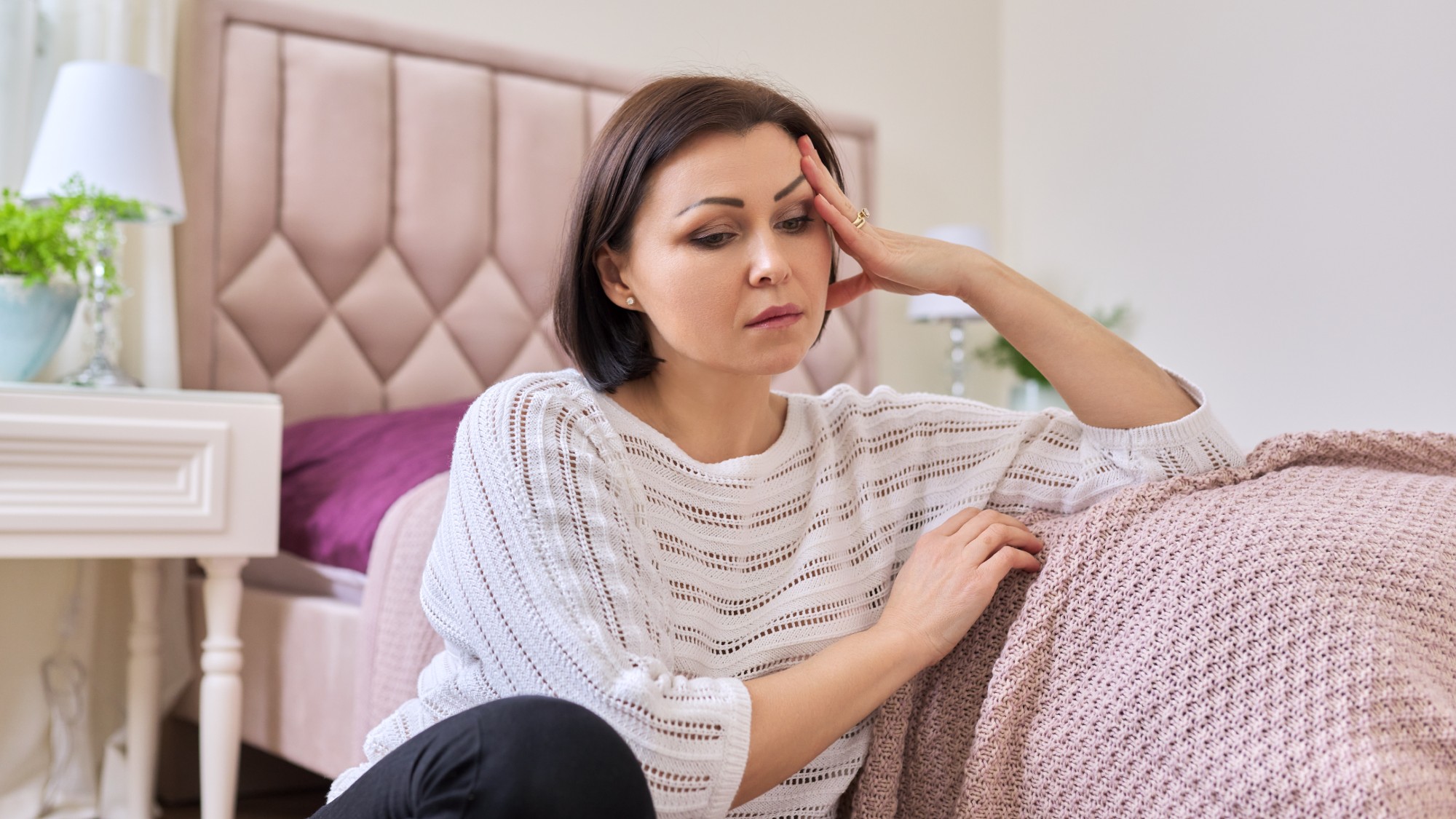Why perimenopause is being called the second puberty
Many women are uninformed about this little-discussed stage of life


A free daily email with the biggest news stories of the day – and the best features from TheWeek.com
You are now subscribed
Your newsletter sign-up was successful
Remember puberty? You probably wish you didn't. Experiencing uncomfortable hormonal changes the first time around most likely felt like enough, but women are quietly undergoing something akin to a second puberty. It is called perimenopause and refers to the transition into menopause that typically begins in a woman's mid- to late 30s, according to Healthline. The process can involve changes to hormones, skin, hair, weight and more.
Perimenopause has been in the spotlight of late. Filmmaker Miranda July's new book "All Fours" was called the "first great perimenopause novel" by The New York Times, and actress Naomi Watts recently declared that perimenopause should become "the new puberty," that way it might garner more empathy and attention. When Watts hit perimenopause, "there was no information, no community," she said to The Wall Street Journal. Many non-famous women feel similarly uninformed about this little-discussed stage of life.
What is perimenopause?
To be clear, perimenopause is not literally a second puberty — there is only one of those, and it happens during adolescence. But while "second puberty" is not an official medical term, the slang is sometimes used to describe the point in a woman's life when "irregular estrogen levels cause the physical changes of perimenopause," said Healthline. Perimenopause typically occurs about three to five years before menopause (which usually begins during a woman's 40s) and is a "natural process prompted when the ovaries gradually stop working," said Johns Hopkins Medicine.
The Week
Escape your echo chamber. Get the facts behind the news, plus analysis from multiple perspectives.

Sign up for The Week's Free Newsletters
From our morning news briefing to a weekly Good News Newsletter, get the best of The Week delivered directly to your inbox.
From our morning news briefing to a weekly Good News Newsletter, get the best of The Week delivered directly to your inbox.
Menopause is widely known to be a marker of the end of a woman's reproductive life, designated 12 months after her last period, said the National Institute on Aging. However, many people are less aware that perimenopause comes before it, and can cause symptoms like declining bone and muscle mass, wrinkles, sagging skin, graying hair, irregular periods, decreased fertility, vaginal dryness and hot flashes. Many of these symptoms echo those that crop up for 90% of women during menopause.
A study published in the Journal of Affective Disorders last month also links perimenopause to a significant increase in the likelihood of depression. According to the study, "women in this stage are about 40% more likely to experience the mental health condition than premenopausal women," said CNN. This is partly because levels of estrogen, the main female hormone, rise and fall "unevenly" during perimenopause, said Mayo Clinic. Estrogen, in turn, has "been found to affect the metabolism of neurotransmitters such as dopamine, norepinephrine, β-endorphin and serotonin, all of which have a role in emotional states," said the Journal's study authors to CNN.
Why does perimenopause fly under the radar?
Many women do not expect to experience menopausal symptoms as early as their 30s, and thus do not link these symptoms to menopause. "I'm seeing more and more women in perimenopause who feel that their symptoms are being dismissed," JoAnn Pinkerton, an OB/GYN at the University of Virginia and executive director emeritus of the North American Menopause Society, said to The Washington Post. "Clinicians might not recognize the symptoms, and even if they do, women are often told it's just life and that there is nothing to be done," added Leana Wen in her column for the Post.
Although approximately 2 million women reach menopause every year, "fewer than 1 in 10 physicians treating these individuals feel prepared to do so," said CNN, citing a study published in Mayo Clinic Proceedings. Healthcare providers often fail to make their female patients aware of medications that could help alleviate perimenopause and menopause symptoms. "Even lifestyle changes [can] help, like healthier eating, avoiding alcohol, regular exercise and stress reduction," Pinkerton said.
A free daily email with the biggest news stories of the day – and the best features from TheWeek.com
The problem does not merely lie with doctors. Ninety-nine percent of preclinical aging studies ignore menopause, said Harvard Medical School, and "this gap in research translates to gaps in women's health care." Normalizing and promoting this tricky stage of life seems to be an important first step in helping women better navigate their health struggles.
"It's normal for parents to talk to girls about their first period," Wen said. "Virtually everyone has some idea of what to expect during puberty. We should have similar conversations to normalize and increase awareness of perimenopause and menopause."
Anya Jaremko-Greenwold has worked as a story editor at The Week since 2024. She previously worked at FLOOD Magazine, Woman's World, First for Women, DGO Magazine and BOMB Magazine. Anya's culture writing has appeared in The Atlantic, Jezebel, Vice and the Los Angeles Review of Books, among others.
-
 How to Get to Heaven from Belfast: a ‘highly entertaining ride’
How to Get to Heaven from Belfast: a ‘highly entertaining ride’The Week Recommends Mystery-comedy from the creator of Derry Girls should be ‘your new binge-watch’
-
 The 8 best TV shows of the 1960s
The 8 best TV shows of the 1960sThe standout shows of this decade take viewers from outer space to the Wild West
-
 Microdramas are booming
Microdramas are boomingUnder the radar Scroll to watch a whole movie
-
 ‘Zero trimester’ influencers believe a healthy pregnancy is a choice
‘Zero trimester’ influencers believe a healthy pregnancy is a choiceThe Explainer Is prepping during the preconception period the answer for hopeful couples?
-
 Growing a brain in the lab
Growing a brain in the labFeature It's a tiny version of a developing human cerebral cortex
-
 Mixed nuts: RFK Jr.’s new nutrition guidelines receive uneven reviews
Mixed nuts: RFK Jr.’s new nutrition guidelines receive uneven reviewsTalking Points The guidelines emphasize red meat and full-fat dairy
-
 Trump HHS slashes advised child vaccinations
Trump HHS slashes advised child vaccinationsSpeed Read In a widely condemned move, the CDC will now recommend that children get vaccinated against 11 communicable diseases, not 17
-
 The truth about vitamin supplements
The truth about vitamin supplementsThe Explainer UK industry worth £559 million but scientific evidence of health benefits is ‘complicated’
-
 Deaths of children under 5 have gone up for the first time this century
Deaths of children under 5 have gone up for the first time this centuryUnder the radar Poor funding is the culprit
-
 Health: Will Kennedy dismantle U.S. immunization policy?
Health: Will Kennedy dismantle U.S. immunization policy?Feature ‘America’s vaccine playbook is being rewritten by people who don’t believe in them’
-
 Stopping GLP-1s raises complicated questions for pregnancy
Stopping GLP-1s raises complicated questions for pregnancyThe Explainer Stopping the medication could be risky during pregnancy, but there is more to the story to be uncovered
